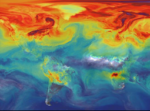For decades, understanding the behavior of a nuclear mushroom cloud was done with careful analysis of observations made during the testing era. Old photos, outdated film and incomplete weather data made precise calculations difficult. Now, with results published in Atmospheric Environment, Lawrence Livermore National Laboratory (LLNL) scientists are improving our understanding of nuclear cloud rise using a […]
How Deep Learning is Driving New Science
In this special guest feature, Robert Roe from Scientific Computing World looks at the development of deep learning and its impact on scientific applications. “In general, it depends on the use case but you can think of two cases where AI is useful. The first case is to solve problems that are hard to solve in a rule-based way, which is a similar domain as you may have outside science for speech recognition or image recognition.”
The CLAW DSL: Abstractions for Performance Portable Weather and Climate Models
Valentin Clement from the Center for Climate System Modeling in Switzerland gave this talk at PASC18. ‘In order to profit from emerging high-performance computing systems, weather and climate models need to be adapted to run efficiently on different hardware architectures such as accelerators. This is a major challenge for existing community models that represent very large code bases written in Fortran. We introduce the CLAW domain-specific language (CLAW DSL) and the CLAW Compiler that allows the retention of a single code written in Fortran and achieve a high degree of performance portability.”
PASC18 Keynote to Focus on Kilometre-Scale Earth System Simulations
Today the PASC18 conference announced that Nils P. Wedi from ECMWF will be one of its keynote speakers. “This talk will illustrate the need for and practicality of producing ensembles of km-scale simulations, summarize progress on accelerating state-of-the-art global weather and climate predictions, and discuss outstanding issues and future directions on producing and analysing big weather data while balancing time-critical customer needs with energy- and time-to-solution.”








